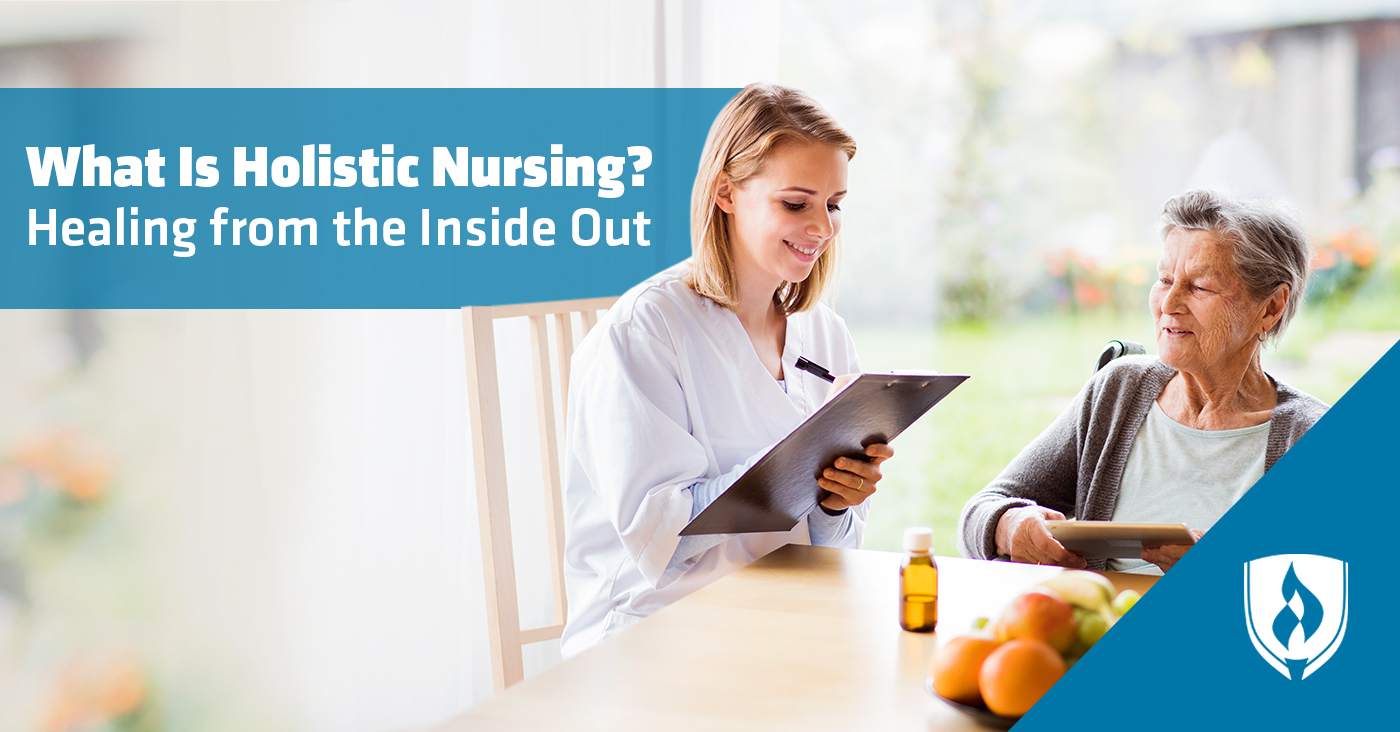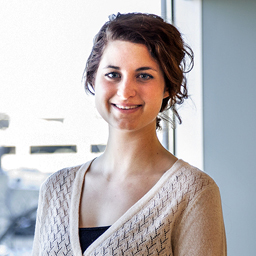
Pretty much everyone has an idea of what a nurse does—they help patients treat and avoid medical issues and improve their overall health. But if you’ve spent some time digging into the specific focus areas of nursing, things can get less clear. One nursing focus area that may have piqued your curiosity is holistic nursing. A quick Google search will tell you that holistic (in a medical setting) means to treat the whole person. That sounds great, but there are several other questions you’ll want to have answered before deciding if this is a nursing field worth pursuing.
In this article, we’ll address big questions like, “What is holistic nursing?”, “What can a holistic nurse do?” and “What does it take to become one?”
Learn about the ideologies, duties, education and experience needed to become a holistic nurse, and finish this short read with a better understanding of this nursing niche.
Get Your Nursing School Questions Answered at a Nursing Information Session
What is holistic nursing?
“Holistic nursing considers all aspects of the human condition: the emotional, the psychological, the physiological, the environmental, the socioeconomic and the spiritual,” says Keith Carlson, nurse liaison at Nurse.org.
Carlson uses the example of a diabetic patient who is living without basic amenities, like running water and electricity. This patient can’t be expected to provide nutritious meals for themselves and must be viewed with the “wide-angle lens” of holistic nursing. All the problems—socioeconomic, environmental, physical and even spiritual—are considered when treatment options are explored.
“The patient is viewed as a whole, and no aspect of the patient's life is considered out of context,” Carlson says.
And with the increasing number of chronic conditions in the US population today, holistic nursing provides them with more options in their treatment.
“Holistic nurses understand that a pharmacologic or surgical approach is not always the only answer,” says Rasmussen College Assistant Professor of Nursing Dianne M Johnson, MA, RN, PHN, AHN-BC. “Nursing, by nature, has always been holistic.”
What is the appeal of holistic nursing?
It’s care for the whole person
“Holistic nursing is on the rise because many nurses want to deliver care that considers the whole person,” says Carlson. “Nurses want to feel that their work is less task-based and more centered on true healing and patient well-being.”
It’s not “disease-centric”
“In holistic medical and nursing care, more than just the apparent symptoms are addressed,” says Carlson. “Holistic nursing is not a disease-centric model of care.” With the example of the diabetic patient, a holistic nurse would seek to partner with other professionals to address the socioeconomic and environmental concerns in addition to the physical.
Nurses see the need
Sometimes, traditional medicine alone just doesn’t cut it. Perhaps some methods are not working or are only solving part of the problem. Whatever the case, more and more nurses and medical professionals are seeing the need for holistic care.
“An increasing number of nurses see the need to integrate complementary therapies like acupuncture, massage, etc. into mainstream healthcare,” says Carlson.
It produces better outcomes
Research suggests that holistic nursing produces better patient outcomes – an appeal for both patients and nurses.
“There is research to support better patient outcomes with a holistic, integrated approach,” Johnson says. “Patients feel this authenticity and human caring. It’s not just about what we do as nurses.”
It’s a healthier practice for nurses
In a profession that runs the risk of nursing burnout, the ideals of holistic nursing help not just the patients, but also the nurses caring for them.
>“Holistic nursing invites and encourages nurses to integrate self-care, spirituality and reflection in their own lives and in their work,” Johnson explains. “Self-care is one of the core values of holistic nursing.”
She goes on to say that holistic nurses understand the importance of caring for themselves in order to be fully available and present to care at the highest level for others. This ultimately can prevent burnout or compassion fatigue in the nursing profession, thus keeping nurses in practice.
What does a holistic nurse do?
“It is interesting being asked about the ‘things a holistic nurse may do,’ as it demonstrates how individuals may have a misperception about holistic nursing,” Johnson points out. “The misconception is that holistic nursing is about ‘doing’ when at the heart of holistic nursing, it is about ‘being.’”
Nurses do not need certifications in complimentary or alternative medicine in order to practice holistic nursing, though many choose to pursue these in areas such as clinical aromatherapy, healing touch, mindfulness meditation, guided imagery or massage, she explains.
Holistic nurses integrate “complementary” medicine into nursing practices. Depending on the location and/or available treatments, a holistic nurse may do any of the following, according to Discover Nursing:
- Acupuncture
- Stress management
- Aromatherapy
- Meditation
- Hypnosis
- Hydrotherapy (exercises in a pool as part of treatment for conditions)
- Balneotherapy (treatment of a disease by bathing in mineral springs)
- Wellness coaching
“Holistic nurses can open independent healing practices, integrating dance, aromatherapy, music, yoga and other modalities with their nursing expertise,” says Carlson. He goes on to say that holistic nurses might go on to open their own practice as a holistic nurse practitioner or collaborate with their team to incorporate complementary medicine practices into traditional medical care.
Is holistic nursing credible?
If seeing treatments like hypnosis, aromatherapy and acupuncture makes you skeptical, that’s perfectly understandable. Complementary medical treatments like these are not meant to be used as the primary treatment option for patient ailments—a holistic nurse isn’t going to have a patient use only peppermint oil to cure serious illnesses.
The idea is to provide additional options that can help patients beyond typical medical treatments. Regular meditation sessions might not make cancer go into remission, but it can help improve the mental and emotional state of a patient facing a difficult treatment schedule. That’s the value of a holistic approach to nursing, even if you remain skeptical of some of the methods employed.
How do you become a holistic nurse?
Earn a Nursing degree
With most nursing specialties, your first step is attending Nursing school and earning a degree. In order to get board certified as a holistic nurse, you will first need to become a registered nurse (RN). There are two options for becoming an RN—an Associate’s Degree in Nursing or a Bachelor of Science in Nursing. Once you’ve completed the required coursework, you’ll need to pass the NCLEX-RN exam and earn a Nursing license from the state in which you intend to practice.
Build nursing experience
Once you’re an RN, and ready to start your journey toward holistic nursing, you’ll want to start gaining experience as a nurse. Many Nursing specialization certification programs—including holistic nursing—require candidates to have at least a year of full-time nursing experience before being eligible for certification.
Get certified
Once you’ve built up enough nursing experience, then you’ll be ready to apply for certification. The primary certification for holistic nursing is done through the American Holistic Nurse Certification Corporation (AHNCC). Requirements may vary depending on the certification you pursue, so be sure to check before applying.
Get involved
“There is a robust national organization, the American Holistic Nurses Association, serving over 4,500 holistic nurses. They provide continuing education, research, practice, networking and advocacy,” Johnson says. A few years ago she started a local chapter of holistic nursing in northern Minnesota.
“This has provided an opportunity for networking, interdisciplinary collaboration, continuing education and a visible holistic presence in the area,” she explains.
You can locate your local chapter of holistic nursing in your area on the AHNA website.
Know what’s out there
Now that you’ve got the handle on what holistic nursing is, there’s still plenty to learn about complementary medicine—even if you have no interest in being a holistic nurse! To learn more about complementary medicine and how it overlaps with traditional nursing, check out our article, “7 Things Nurses Should Know About Complementary Medicine.”
RELATED ARTICLES:




